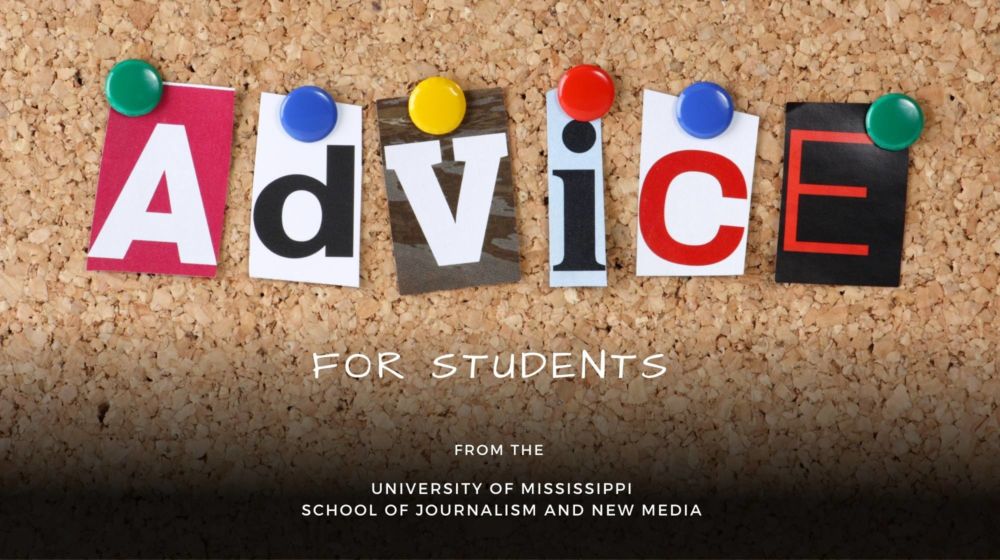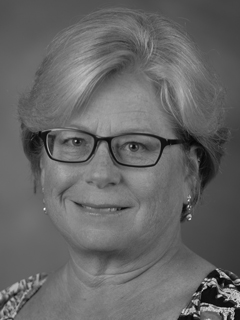
A new semester has begun at the University of Mississippi School of Journalism and New Media, and some of our professors are offering the following advice to students:

Graham Bodie
Listen to Other Perspectives. Graham Bodie, Ph.D., professor of integrated marketing communication, said go to class and ask questions that provide deeper understanding, especially around issues that are complex and infused with multiple diverse perspectives.
“Learn to hold two or more seemingly contradictory perspectives as plausible before accepting or rejecting anything out-of-hand,” he said. “Try to read something or talk to someone who disagrees with you every day.”
Speak Up. Bodie said speak with passion and confidence toward a position you feel strongly about and about which you have some knowledge and/or experience, and always listen like you might be wrong.
You Might Be Wrong. “Don’t be surprised when you are wrong, and don’t treat others’ wrongness as a weapon to wield in a battle over who gets to win an argument that may not actually have a single right answer,” he said.
When you have the privilege of being in a position of power, Bodie said “leverage the diversity of views and perspectives on those large, messy, complex problems with which you have been tasked, and take risks on solutions that involve collective intelligence.”
Fail. And remember, we sometimes learn by failing.
“Fail here, while you can do so in a ‘safe’ environment,” he said. “Don’t read ‘safe’ as an environment that makes you feel comfortable. You should sometimes be uncomfortable.”

Emily Bowen-Moore
Communication is Key. Emily Bowen-Moore, instructional associate professor of integrated marketing communication, said to communicate with instructors.
“It makes all the difference in the world,” she said.

Elizabeth Allen Estes
Read the Directions. Elizabeth Allison Estes, adjunct instructional assistant professor of integrated marketing communications, shared this message:
“Dear Gen Z Student, You are so wonderful in so many ways. But having grown up entirely immersed in digital technology, you tend to assume that you can accomplish tasks intuitively. You will save us both a lot of extra work and sadness if you will read the directions FIRST, and then just follow them. With great affection, Professor Gen X.”

Robin Street
Record Due Dates in a Calendar. Robin Street, adjunct instructor of integrated marketing communications, said her advice is basic, but effective.
“At the beginning of the semester, get all your syllabi together,” she said. “Then get a calendar, either a hard copy or a digital one. Carefully go through each syllabus and highlight every due date. Then, one by one, put all those dates on your master calendar.
“Yes, it will be tedious, but it will help you so much. If due dates change, be sure and go back and change your calendar.”
Write Reminders. Street said it’s helpful to make note of items a week or two before the due date.
“Write on your calendar on Oct. 15 that a paper is due in two weeks. That way, dates don’t sneak up on you.”
Work Each Day. Street’s second piece of advice is to devote a little time daily towards a big project.
“The longer you put that project off, the bigger it gets,” she said. “I do this myself when I have a lot of papers to grade. I devote one hour to grading. I don’t get them all graded, of course, but it makes headway. Then, the next day, I devote another hour.”

Kristen Alley Swain
Build Your Skills. Kristen Alley Swain, Ph.D., associate professor of journalism, said search for ads for your dream job(s). Then make a list of the skills and background these employers want that you could obtain while enrolled at UM.
“College is the easiest time to do this – because right now, you have the resources and support to do it,” she said. “For instance, you might produce content for a nonprofit or campus office, attend events related to your interests to help you network, and volunteer for leadership roles in a student club.
“Use every course to help build your professional ‘toolbox’ — add skills, perspectives, experiences, knowledge, content, publications, and other deliverables that will help you succeed in a tough job market. Demonstrating tenacity, a strong work ethic, effective time management habits, and a willingness to actively participate in every class will greatly help you get good references and launch a fantastic career.”

Stefanie Goodwiller
Talk to Your Professors. Stefanie Goodwiller, adjunct instructor of media design, said don’t be afraid to ask questions.
“If you are unsure of something, ask your professor before asking your peers,” she said.

Debbie Woodrick Hall
Set Goals. Debbie Woodrick Hall, instructional assistant professor of integrated marketing communication, shared a few Ole Miss Student Survival Tips written by Bonnie Brown.
“So maybe you haven’t answered the question of ‘what do you want to be when you grow up,’” Brown said. “The Career Center can help with that. But you can set some goals for the semester—a certain GPA, some type of behavior modification, establish an exercise routine, actively participate in class. Whatever it is, make it yours, and set yourself up for success! You got this!”

Robert Magee
Use Memory Recall. Robert Magee, Ph.D., associate professor of integrated marketing communication, said a good way to prepare for a test is to use a blank sheet of paper.
“Write down everything you can remember,” he said. “Then, compare it to your notes to see what you missed. Recall memory is much more difficult than recognition memory, so this will give you an idea of how well you are prepared.”
Define a Concept. “When you’re trying to master a concept, see if you can define it in your own words in no more than two sentences,” Magee said. “If you can’t define it in two sentences or less, then you don’t know what you’re talking about. It’s a sign of muddled or half-baked thinking. To write well, you first must think well.”

Lynette Johnson
Look for Opportunities. Lynnette Johnson, Ed.D, said, “Be open to unexpected opportunities that arise. Walk through that door of opportunity…you never know where it may lead. If you don’t ask, then the answer is already ‘No.’”

Ellen Meacham
Get Involved. Ellen Meacham, adjunct assistant professor of journalism instruction, said attend every panel discussion, guest speaker or free event you can.
“It’s a great chance to learn about the world from people who are out there in it,” she said. “You will never have such a distinguished, informed, cross-section of experts so easily accessible again. You will learn a lot, and it’s also a great way to make contacts and network for future internships and jobs.”

Mike Tonos
Come to Class. Mike Tonos, journalism coordinator and instructional associate professor, said show up and get to know your instructor, even if that means a one-time, short, one-on-one meeting. This applies across the board, not just to in-person classes.
“For all, do the work you’re assigned,” he said. “In my classes, you’ll get at least some credit for turning in your assignments. The alternative is an automatic zero.”

Debora Wenger
Remember — it all matters. Debora Wenger, Ph.D., associate dean, said there’s no such thing as “syllabus day.”
“Seriously, make every class period count and stay on top of assignments,” she said. “It’s always going to be easier to do well in a course if you avoid falling behind.
“Pro tip: Take advantage of every extra credit opp — you never know when you’ll need those three more points.”
